British democracy is alive and well—the people seemed to have voted for Brexit with their hearts, not their immediate pocketbooks. UK voters instructed to their government to pull the plug on their nation’s membership in the grand experiment known as the European Union, which in turn weakened their buying power and roiled global financial markets.
Although polls had predicted a close election, markets had begun expecting (or perhaps aspiring) that British voters would follow the view of most economic experts and choose to remain in the EU, and as a result, rallied and closed higher in the run up to the vote. Because the markets were surprised by Brexit, the price adjustments were especially large and sudden. It was not a vote of confidence in the experts or for the Prime Minister, who quickly resigned. And the millions of Americans who own stocks or have their retirement in the market—took a hit today, with the market dropping over 3 percent, losing the entire amount that the Dow had gained so far in 2016.
Markets were volatile and huge swings in currencies, bonds, and sharp drops in stock markets followed early on Friday. Volatility eased back some over the day, as investors may have taken some comfort from the announcements of actual and potential central bank liquidity support. This vote will be one of the first big tests of global financial market structure and regulation since the new rules put in place after the financial crisis, such as the Dodd-Frank Wall Street Reform and Consumer Protection Act, the Financial Stability Board, and the European Market Infrastructure Regulations.
Currency markets for large, developed nations are mammoth and usually highly stable, with small changes on a daily basis. On a normal day there are over $2 trillion of British pounds traded. This exchange is mostly the result of real economic and financial activity taking place as people buy and sell goods, services, investments, etc., between the United Kingdom and the rest of the world. Stable, liquid currency markets are essential for global trade as people need to know how much goods will cost them in their own currency, which depends on the exchange rate between their currency and the British pound.
As opposed to stocks of even ‘blue chip’ companies, which can swing in a day as a result of bad earnings or investor discontent, currencies like the pound or dollar rarely make sharp daily movements of more than 5 percent. Friday’s decline of over 8 percent by the Pound against the dollar was the second largest daily change between the dollar and any major currency on record. The British Pound Sterling hit its lowest level against the US dollar since 1985, when the Back to the Future was at the top of the box office and we could go see it for $2.75, Windows 1.0 was just released, and New Coke made it’s debut (with old Coke coming back 3 months later). We should expect to see American exports to Britain fall – in raw numbers, over 11 million US jobs are supported by exports, according to the International Trade Administration, and the UK is the 5th largest destination for our goods.
Brexit has had an immediate impact on prosperity: The world is poorer today as a result of this choice. Stock market declines in Europe were even larger than in the US. Concerningly, spreads of other European countries debt widened with markets beginning wonder if there are more dominoes to fall if other countries consider following Britain’s exit path. British consumers will be immediately hurt as much of what they buy will become more expensive. Already the pound has lost 5 percent of its value against the Euro, making goods made Europe more expensive at the shelf in the UK. The global fall in equity markets erased a lot of wealth and the flight of capital to safe haven assets like government bonds is not indicative of a private market that expects strong economic growth in the UK. A recession in Britain was predicted by many experts if they voted to Brexit causing businesses to hold back on capital spending and households to factor in slower longer-run growth in incomes. We’ll see if the experts are right about the ramifications of Brexit even if they were wrong about the results of the referendum.
The referendum is a big step, but only a first step. With new elections for prime minister on the horizon and time to realize the economic ramifications of Brexit, it is possible that the people of the UK could change course. Remember that is what Congress did when it first voted down TARP as a response to the financial crisis only to reverse course in a few short weeks.
Naturally, the UK election casts a shadow of our November elections. Does it portend more support for Donald Trump’s anti-immigrant, anti-trade populism? Or could 4 months of steady bad economic news from across the Pond help Hillary Clinton show the consequences of countries and continents dividing? Only time will tell.
Editor’s note: This piece originally appeared in U.S. News & World Report.
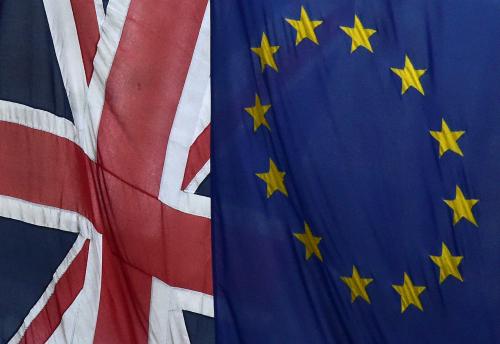
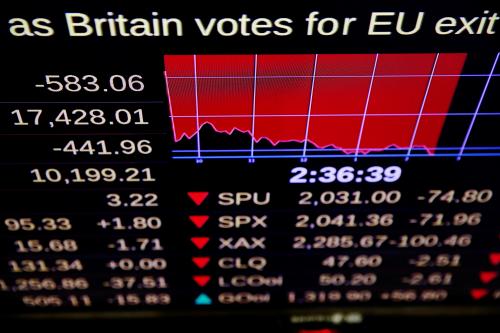
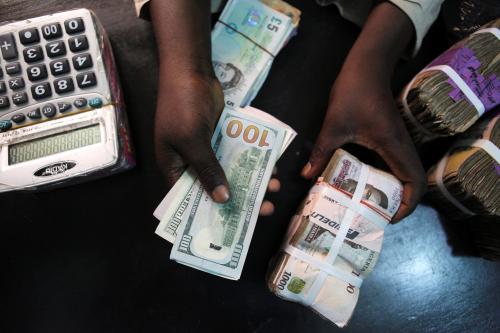

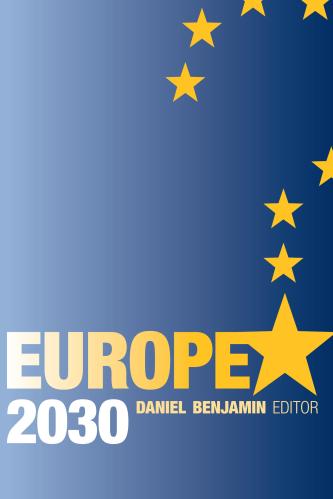



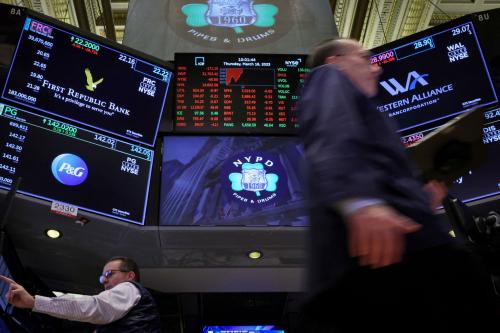
Commentary
Op-edThe post-Brexit world is poorer
June 24, 2016